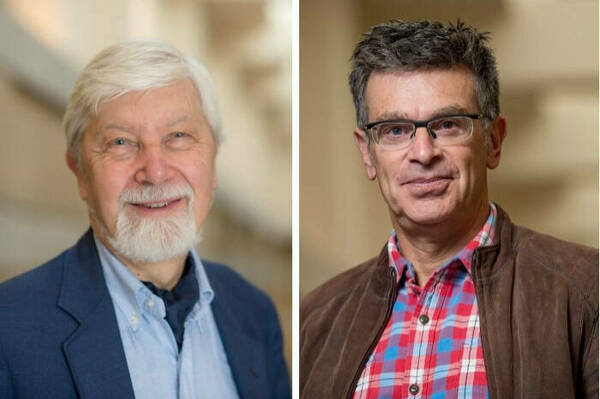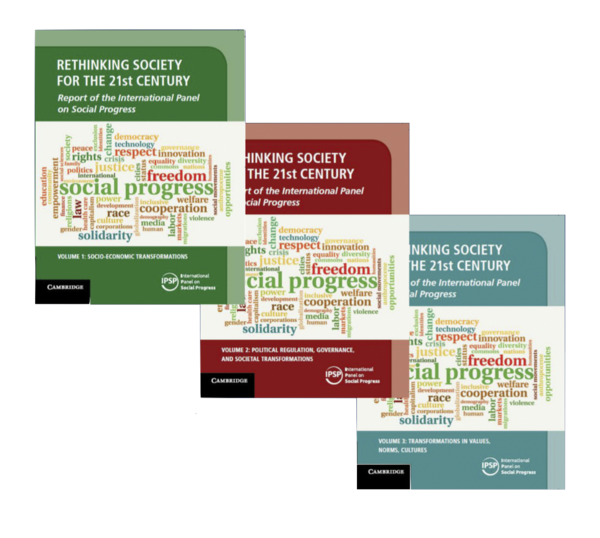
Two faculty members at the University of Notre Dame’s Kroc Institute for International Peace Studies have made instrumental contributions to a new three-volume report, Rethinking Society for the 21st Century, published by the International Panel on Social Progress (IPSP). Laurie Nathan, Professor of the Practice of Mediation, and Peter Wallensteen, Richard G. Starmann Sr. Research Professor Emeritus of Peace Studies, were both part of the writing group responsible for Chapter 10 focused on global trends in violence, wars, peace, and security.
Wallensteen, a member of the IPSP, was one of the editors and conveners of the chapter’s 12-person multidisciplinary writing group. In total, over 250 researchers from all around the world and from a wide variety of disciplines in both the sciences and humanities contributed to the project.
“The formation of the IPSP and this report are an attempt by social scientists to make a scholarly-based statement on the direction of the world in terms of social

progress,” said Wallensteen. “Do present global trends move the world closer to a situation that meets demands that can be defined as progressive, such as equality, dignity, well-being, freedom, security, solidarity, pluralism, and democracy?”
The first volume of the report focuses on global economic trends and inequalities, the second volume (which includes the chapter on violence, wars, peace and security) focuses on political issues and trends, and the final volume examines cultural and value transformations in global societies. Drawing inspiration from the work of the International Panel on Climate Change, the IPSP report is meant to “provide the reader with a unique overview of the state of society and [its] possible futures, with a mine of ideas of possible reforms and actions,” according to the report’s Executive Summary.
“Using the term social progress represents a counterpart to climate change,” said Wallensteen. “We need to progress to make sure that all people in global societies are treated with dignity. That is the impetus behind this report.”
Nathan found the project exciting because of its ambitious goal to influence policymakers at national and global levels.
“The project was attractive because it aspired to develop a comprehensive and holistic assessment of social progress,” said Nathan. “The process of collective review and deliberation of individual authors’ work was intellectually exciting and made for rich and productive discussions.”
To write the report, researchers met on two occasions in Paris and Lisbon, but kept the conversation going through virtual meetings and e-mail exchanges. Although Wallensteen noted that the group wrestled with many ideas and was certainly not of one mind on a variety of topics, trends did emerge that bridged different geographical and disciplinary perspectives.
“We agreed that all of these troubles—violence, wars and finding peace and security—really require global approaches and we could all agree that an effective global response is missing,” said Wallensteen. “The current global structures are really very weak and often unable to adequately address these questions. When you hear that idea coming from different geographical perspectives the need becomes very clear.”
Nathan also noted that key takeaways from the writing process included a recognition that progress regarding the elimination of violence and cultivation of peace and security has not been uniform around the world, and that scholars of these topics still have much work to do.
“Scholars have not generated strong cumulative knowledge [of violence, peace and security] that is readily implementable by policymakers,” he said.
The IPSP report is one intentional step forward by scholars working to change that.
The full report is available for purchase from Cambridge University Press. You can also read the full Executive Summary online.
About the Kroc Institute
The University of Notre Dame’s Kroc Institute for International Peace Studies, part of the Keough School of Global Affairs, is one of the world’s leading centers for the study of the causes of violent conflict and strategies for sustainable peace.
Originally published by at kroc.nd.edu on January 03, 2019.